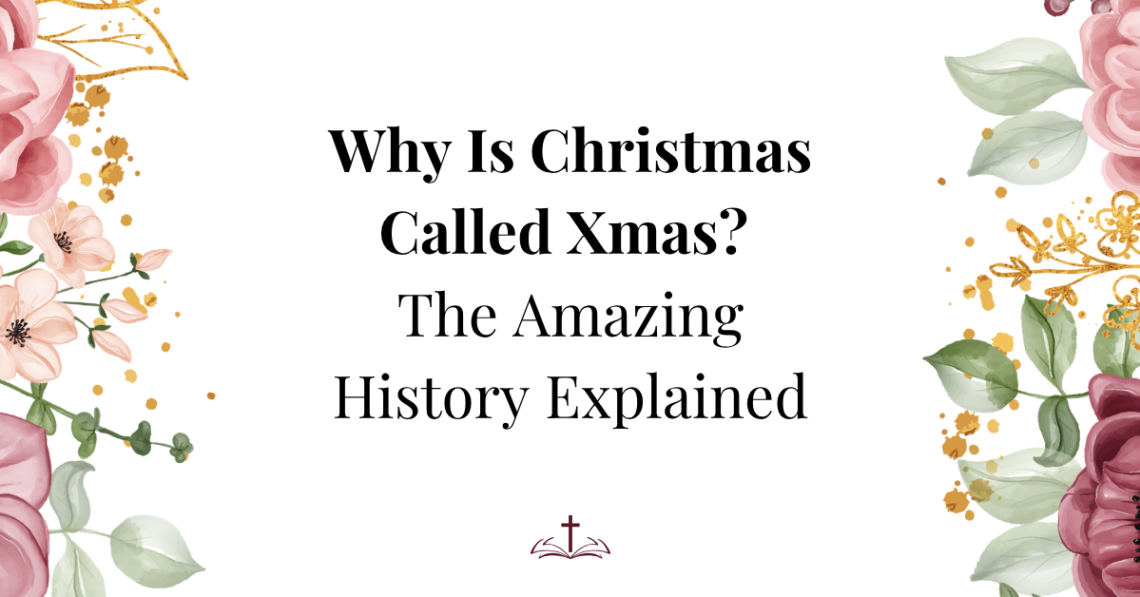The holiday season brings with it many beloved traditions, decorations, and greetings. Among the common phrases, you might encounter “Xmas” as a shorthand for “Christmas.” For some, “Xmas” feels like a modern or secularized twist, sparking debates over its appropriateness. But where does this abbreviation come from, and why is Christmas called Xmas? The truth is that its origins are steeped in history and tradition, with roots in Christianity itself.
The Historical Roots of “Xmas”
The term “Xmas” isn’t a modern invention. In fact, it dates back to at least the 16th century and has its origins in the Greek language. In Greek, the word for Christ is Χριστός (Christos), and the first letter, “Chi,” is represented by the symbol Χ, which looks like the English letter “X.” Early Christian writers frequently used “X” as a shorthand for “Christ,” especially in religious manuscripts. This wasn’t done to remove Christ—it was a practical and respectful abbreviation. Understanding why Christmas is called Xmas takes us back to these early Christian traditions.
Meanwhile, the “mas” in “Christmas” comes from the Old English word “Mass,” referring to the Eucharistic celebration. So, “Xmas” literally means “Christ’s Mass.”
Common Usage Through the Ages
During the Middle Ages, scribes and scholars used “X” to save space when writing religious texts. Writing materials like parchment were expensive, so abbreviations were common. Far from being irreverent, this practice was seen as a way to honor Christ while making writing more efficient. The use of “X” as a stand-in for “Christ” was also widely recognized by those in the religious community, showing its acceptance among believers.
Later, in the 18th and 19th centuries, “Xmas” appeared in English literature and correspondence as a widely accepted abbreviation. Even religious leaders and devout Christians used it without controversy. For instance, “Xmas” was often used in personal letters, journals, and even church-related documents as a practical shorthand. This historical acceptance highlights why Christmas is called Xmas in certain contexts.
Why Do People Use It Today?
In modern times, “Xmas” has become a popular way to save time and space, especially in advertising, signage, and casual communication. With the rise of text messages and social media, where brevity is often essential, “Xmas” continues to be a convenient shorthand. It’s especially useful in contexts like holiday cards, where space for writing may be limited, or on storefront signs, where fewer letters make for better visibility.
However, misunderstandings have led some people to view “Xmas” as a secular or irreligious term that removes Christ from Christmas. While it’s true that not everyone using “Xmas” today is aware of its Christian origins, its historical context shows that the abbreviation is far from an attempt to diminish the holiday’s spiritual significance. This explains another layer of why Christmas is called Xmas in modern usage.
Misunderstandings and Controversy
The controversy surrounding “Xmas” largely stems from a lack of knowledge about its origins. For some, the “X” appears to cross out Christ, leading to the perception that it’s a modern, secularized way to strip Christmas of its religious meaning. This misunderstanding has fueled debates, especially among those who prioritize the spiritual aspects of the holiday.
Yet, it’s important to remember that early Christians themselves used “X” as a symbol for Christ. In this light, “Xmas” can be seen as a continuation of ancient Christian traditions rather than a break from them. Historically, the “X” was never intended to exclude or replace Christ; it was simply a symbol of Him. Understanding this context can help bridge the gap between differing perspectives on the term and answer the question of why Christmas is called Xmas.
The Role of Language in Tradition
Language is a living, evolving tool that reflects the culture and priorities of its users. Over centuries, the words and phrases we use to describe holidays, traditions, and beliefs have changed to fit the times. “Xmas” is just one example of how language adapts. For those who embrace tradition, the abbreviation might feel too modern or impersonal. For others, it’s a helpful way to communicate in a fast-paced world.
Interestingly, this isn’t the only instance where shorthand has played a role in Christian history. The early Christian fish symbol, for example, was used as a secret code among believers. Symbols and abbreviations have long been a way to express faith, often under challenging circumstances. “Xmas” fits within this broader tradition of adapting language and symbols to meet the needs of the time. This historical background further explains why Christmas is called Xmas.
Modern Perceptions of “Xmas”
Today, perceptions of “Xmas” vary widely. Some see it as a casual, secularized version of “Christmas,” while others recognize it as a practical abbreviation with historical roots. For businesses and advertisers, “Xmas” is often a way to capture attention quickly and fit messages into limited spaces. For individuals, it might simply be a habit or a stylistic choice.
Religious leaders and scholars who understand the origins of “Xmas” often encourage its use as a valid representation of the holiday. They see it as an opportunity to educate others about the rich history of Christian symbols and traditions. However, the term’s modern associations with commercialization can complicate its reception among those who wish to keep the holiday focused on its spiritual meaning.
Balancing Tradition and Modern Convenience
So, should you use “Xmas” or “Christmas”? The answer depends on personal preference. Both terms carry the same meaning, and both can be used to spread the holiday’s message of joy, love, and goodwill. For those who value brevity, “Xmas” offers a quick and efficient way to communicate. For those who prefer the full expression, “Christmas” beautifully captures the traditional spirit of the season.
It’s worth considering the context in which you’re using the term. In formal settings, such as religious services or theological discussions, “Christmas” may feel more appropriate. In casual conversations, social media posts, or artistic expressions, “Xmas” can be a perfectly valid choice. Understanding the history behind “Xmas” allows us to appreciate its usage without judgment. It’s a reminder that even our modern practices often have ancient roots, connecting us to the Christians who came before us.
A Call to Reflection and Interaction
As we celebrate this joyous season, let’s focus on what truly matters: the message of hope, peace, and love that Christmas—or Xmas—represents. The words we use to express this celebration are far less important than the heart behind them. The spirit of Christmas is not diminished by the use of an abbreviation but is instead amplified by our actions and intentions.
Now, we’d love to hear from you!
- Do you prefer “Christmas” or “Xmas” in your holiday greetings? Why?
- Did you already know about the historical roots of “Xmas,” or is this new information for you?
- How do you balance modern convenience with traditional practices during the holiday season?
- What other symbols or traditions have you found meaningful during the holidays?
Share your thoughts in the comments below! If you enjoyed learning about why Christmas is called Xmas, feel free to share this post with others and spread the knowledge. Let’s celebrate the season together, appreciating both its ancient traditions and modern expressions. And as you go about your holiday preparations, take a moment to reflect on the deeper meaning of this special time of year.






